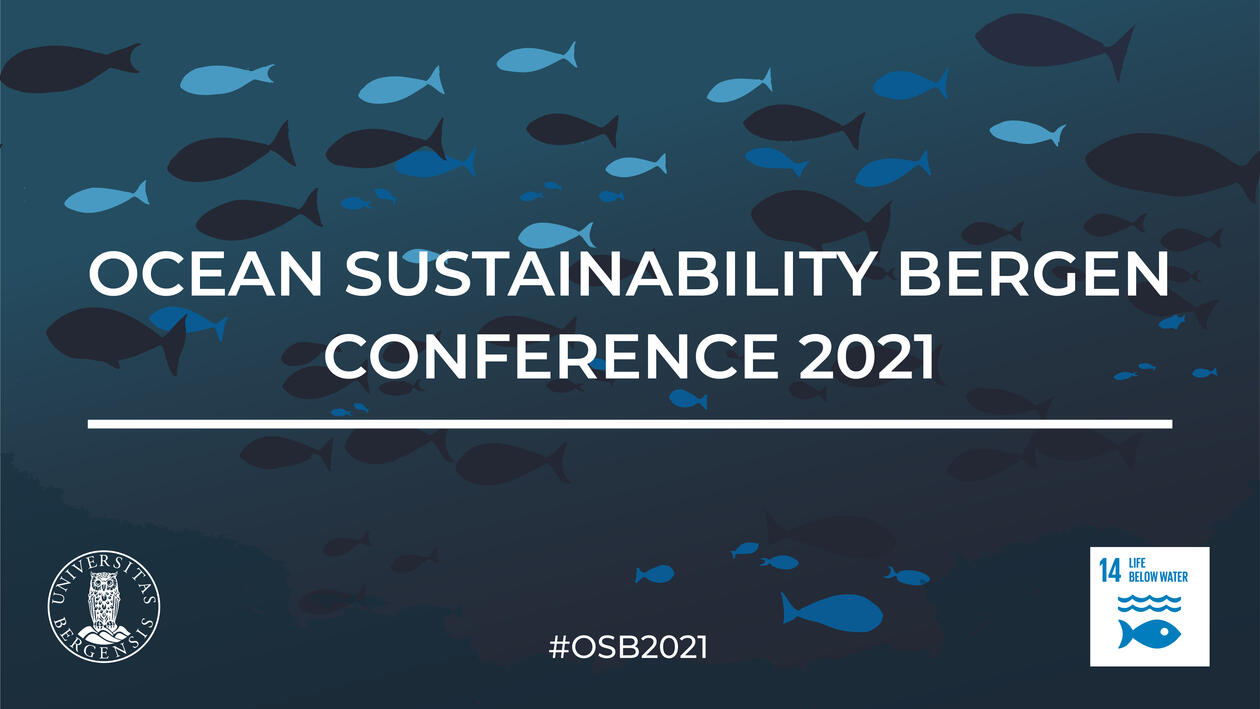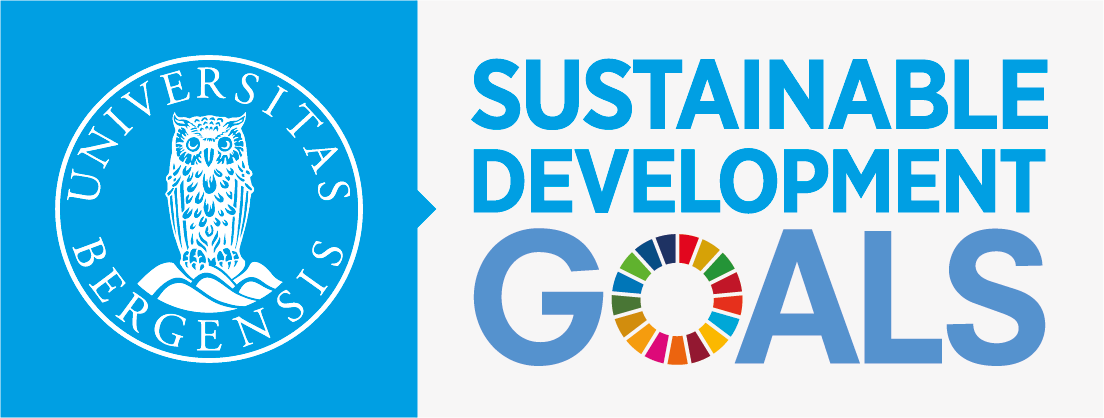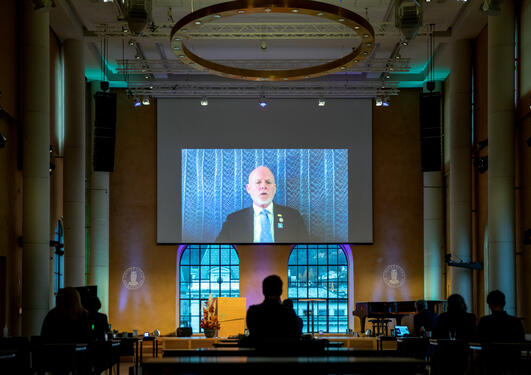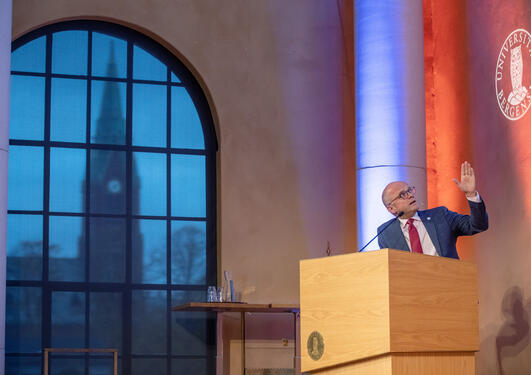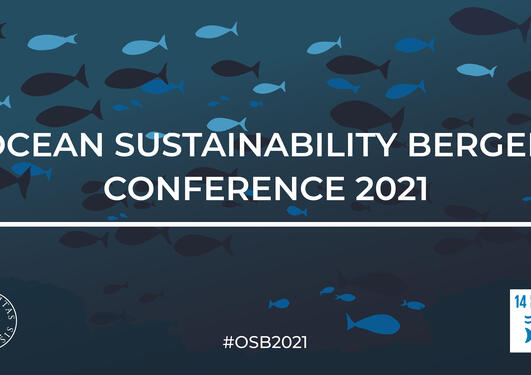Science for the people of the ocean
The discussions at the third Ocean Sustainability Bergen Conference brought together scientists, students, industry, and policymakers taking in everything from the protecting the blue forest to seabed mining and how to create a sustainable balance between preservation and development of the ocean.

Main content
“In 2021 the UN Ocean Decade started calling for collaboration and sharing of data and knowledge across sectors, borders and levels. The vision for the ocean decade is: The science we need for the ocean we want. And we want a clean, healthy, productive, predictive, safe accessible, inspiring, and engaging ocean. If we want to fulfil our wishes, we need actions and we need the action now,” said Scientific Director Lise Øvreås of Ocean Sustainability Bergen (OSB) when opening the 2021 OSB Conference.
A glimmer of hope
“A healthy and productive ocean is crucial for the global population. We need to focus on ocean resources and how these may include the solutions for a growing population and livelihood for coastal communities. The global population is increasing, and we need to harvest more food from the ocean in a sustainable way,” she said.
“Many of these marine industries are new or undergoing restructuring and require good framework conditions and political care to develop positively,” she said sounding a hopeful note despite the recent gloomy report from the Intergovernmental Panel on Climate Change (IPCC) before adding:
“If we are to harvest more food from the ocean we cannot continue with the extensive fishing and overfishing, we have to shift to an increased harvest of lower trophic species such as mesopelagic fish and more carbon-efficient food production with low wastage.”
Solutions through partnerships
Rector Margareth Hagen stressed the need for partnerships to create workable solutions.
“There is no doubt that human activity is changing the climate in unprecedented way. And our beloved ocean is threatened by the consequences of human activities. On August 9, the IPCC released the first part of its sixth assessment report. Once again, the IPCC warns that the world of ours is in quite dire circumstances,” she said.
“At this conference we invite a dialogue that points to possible solutions and a sustainable future for our ocean. These challenges cannot be solved by one sector alone. We need innovative, and maybe even radical, solutions. We need multilateral commitment. We need collaboration across sectors. And we need the science community and policymakers to join forces. This is what we are here for – let us get to work,” exclaimed Rector Hagen.
In praise of the blue economy
In the OSB Lecture the former Prime Minister of Norway and co-chair of the High-level Panel for a Sustainable Ocean Economy, Erna Solberg, focused on the ocean economy, using knowledge from the panel’s research, reports, and recommendations. She quoted Seán Lemass “A rising tide lifts all boats” to point out that when the economy performs well, everyone will benefit: “This fits well with the ocean and the blue economy.”
“The ocean is an engine of the global economy. The ocean contributes billions to the economy each year. Around 90% of all internationally traded goods, travel by ship. The ocean food sector alone provides up to 237 million jobs and millions of people work in other ocean sectors,” said Solberg, “more than 3 billion people rely on food from the ocean as a source of protein and key nutrients. In other words, we are dependent on the ocean.”
This year on World Ocean Day 8 June, the Norwegian government presented its report “Blue Oceans, Green Future”. The report balances the ocean’s need for sustainability and creating values in ocean industries.
“We need to stress the need for ocean knowledge,” she said, “the UN Ocean Decade represents a unique opportunity to address the challenges and the SDGs that are relevant for marine ecosystems and the blue economy.”
“The need for action is urgent,” exclaimed Solberg, “more than ever, we need to keep up the pace in the great transition to create new, blue and sustainable jobs. We have a collective responsibility to protect and restore the health of our ocean. If the ocean and the blue economy do well, we will all benefit from it!”
Managing the ocean
The first of two panels brought the ocean and its people to the problems of climate change and biodiversity loss.
“We talk a lot about managing the ocean, but what we really need is to manage ourselves,” said co-chair of Friends of the Ocean Isabella Lövin, “an ocean framework that really obliges governments to address all the problems of the ocean in a holistic way. A good way to start with managing ourselves.”
“We have reached a certain stage in ocean science. My challenge is that much of our research has been done in different sectors. We need to combine it and get a holistic view of how we use the coast and the ocean to see what it means integrated and in combination,” said oceanography and climate researcher Mari Skuggedal Myksvoll from Norway’s Institute of Marine Research.
Ocean futures
The closing panel at the conference discussed the future and how partnership is necessary to find solutions rather than to be stuck in conflicts and problems. Do we have enough science? Do we have enough knowledge for the ocean of the future? These were some of the questions put during this session.
“Governance of the ocean means governance of coastal areas. A lot of our pollution comes from land. We also must bear in mind that there are already many scientific solutions. We need to work with all stakeholders on possibilities to solve problems that have been generated. The problem is that there are very few simple problems in the ocean,” said Dr. David Smith from the Institute of Sustainable Development at the University of the West Indies, “we need developing communities be able to manage their own fisheries and profit from their own fisheries.”
“Blue forests and in particular seaweed can contribute to the SDGs and poverty reduction. These are the kind of solutions we should be focusing on”, said CEO Nina Jensen of REV Ocean whilst discussing how innovation can contribute to the new blue and sustainable economy.
Director for climate, energy, and environment Stig Traavik from the Norwegian Agency for Development Cooperation (Norad) pointed to a joint private-public coalition to preserve tropical forests, bringing in countries such as Norway, the UK, and the US with global corporations such as Microsoft.
“Nothing is stopping us from doing the same for the ocean,” he argued raising the possibility for an ocean coalition to save the blue forest.
A cautious note on seabed mining
Sounding a cautious note to close the conference OSB Director Lise Øvreås joined forces with anthropologist Edvard Hviding, who is also the Scientific Director of SDG Bergen Science Advice.
“One of the things we have not touched upon, but which has been discussed at a conference going on in parallel only a few hundred meters away from where we are in the University Aula is seabed mining,” they said, “this is one of the greatest challenges to take on and discuss.”
The two suggested seabed mining would be a perfect topic to discuss at a future conference. Maybe the 2022 edition of the OSB Conference?
